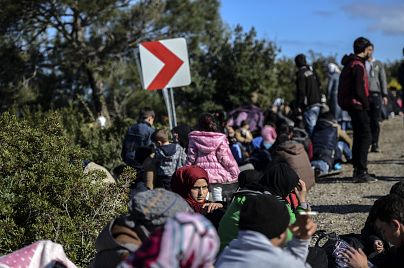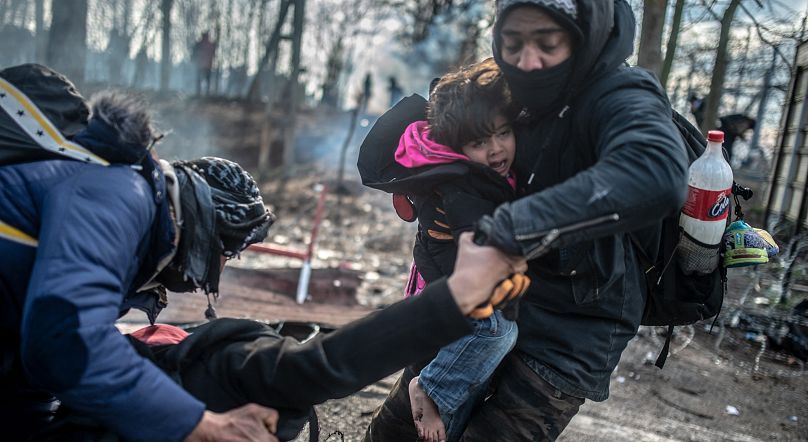The influx of migrants and refugees in the last decade had a big impact on relations between Turkey and the European Union.
Turkey is counting down to elections on 14 May, with the economy the single most important issue for voters.
 ADVERTISEMENT
ADVERTISEMENT
 ADVERTISEMENT
ADVERTISEMENT
But the migrant crisis is also seen as critical -- not just for the public, but for the political parties vying for power.
The last decade has witnessed a wave of arrivals with people fleeing the war in Syria. Many passed through Turkey and went on to Europe, but millions remained in the first point of safety.
Some surveys show that as the number of foreigners has increased, so has anti-migrant sentiment.
That has meant immigration issues are a hot election subject, which could have implications for the EU as well.
The opposition 'National Alliance' bloc is hoping to gain votes by pledging to send two million Syrians back to their homeland within two years. According to official figures, Turkey hosts 3,447,837 Syrian refugees registered under temporary protection as of March 2023.
Meanwhile, President Recep Tayyip Erdogan, facing harsh criticism for his migration policy from his own supporters, has tried to appease both sides.
Last year, he reiterated that his government was working on a return scheme to send one million Syrians back voluntarily. Days later, he said: "We will never expel them from this land. Our door is wide open. We'll continue to host them and not throw them into the lap of murderers."
Five months before the election, Erdogan announced more than half a million Syrians had chosen to go home, saying voluntary returns were "accelerating".
An alternative to the EU-Turkey deal
Migrants have become a bargaining tool between Ankara and the European Union.
In 2016, the EU-Turkey Refugee Deal was struck, which aimed to stop the influx by sending migrants caught entering Greece irregularly back to Turkey. For every Syrian returned, another would be resettled in the EU.
In return, Brussels promised to give Ankara €6 billion to help accommodate Syrians, besides visa liberalisation for Turkish nationals.
For Professor Kemal Kirişci of the Turkey Project at the Brookings Institution, the deal was "utterly successful" for the EU, though he doubted if a similar deal could be struck in the future.
Some 37,000 Syrians have been relocated to Western countries under this one-for-one principle.
According to Kirişci, the most feasible and realistic solution for Turkey would be to use refugees to help rebuild after February's devastating earthquake, rather than expel them.
He pointed to a UN proposal for the EU and West to give Turkey trade concessions if it creates formal and sustainable employment for both Syrian refugees and locals.
Commenting on the proposal, Kirişci writes: "It would reduce Syrian refugees’ dependence on humanitarian assistance, help alleviate public resentment, and diminish the prospects of secondary movements".
He told Euronews Syrians there was strong support for the plan.
"Until last year, Syrian refugees were increasingly feeling integrated into Turkish society," he said.
But growing public resentment has meant refugees are now "doubting their presence and acceptance", making them want to leave.
Recent years have seen growing anti-Syrian sentiment in Turkey, with the economy taking a tumble.
In 2017 only around 32% of Syrians wanted to settle in a third country, in 2021 this number had risen to 64%.
Meanwhile, Kirişci claims migrants are unlikely to be a top priority for the new government, which will face more pressing issues such as the economy.
What will happen in the future?
Regardless of the election result, migration will likely remain a thorny issue for years to come.
"Deportation and returns have been a hot topic for a long time," said Dr Sibel Karadag, an expert on migration and borders at Kadir Has University. "Western countries are deporting migrants to their neighbouring countries and the neighbours sending them to the countries of origin."
She pointed to an official policy of dilution and sweeping in Turkey, where migrants are sent back to areas of northern Syria under Turkish control, "under the name of voluntary returns".
This will continue, according to Karadag.
But more profound changes may be afoot.
In its election campaign, the opposition bloc outlined a four-step solution to the migrant crisis in Turkey.
First, it wants to try and make peace with the country's neighbours and "sit down" with the Syrian government
Erdogan's party is yet to announce its election manifesto. However, his desire to negotiate with Syria and efforts to relocate Syrians are key parts of the election campaign.
For both experts, making peace with Damascus is not a possibility, while Ankara has troops in northern Syria.
Migration and border governance will also remain key to EU-Turkey relations, according to Karadag.
"The EU has aimed to externalise this issue to Turkey as part of its wider global approach to control migration and Turkey has ... turn[ed] it [migration] into multi bargaining tool", she argues.
Ankara has used "the threat" of opening its border to bargain "additional financial support or tacit political tolerance for the regime", Karadag adds.
In February 2020, Erdogan bused thousands of migrants to the Greek border, warning that more would be sent unless international support was forthcoming and the EU stopped criticising its military intervention in Syria.
Violent clashes erupted at the border, with Greek police stopping anyone from crossing.
For Karadag, if Turkey tried to return its migrant population en mass, we may see similar scenes again, though the Turkey-Greece border is much deadlier with proven pushbacks from Greek security forces.
"The European Union will continue to support any kind of extra-legal action to stop migrants reaching its doorstep," she says.
"The first task [for the new government] should be to build a critical and strong diplomacy with rights-based principles against EU's migration and border policies."
"[It] should carry out a policy that puts human dignity at the forefront."












